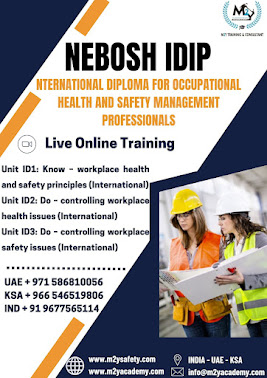What is the difference between Nebosh IGC and HSE?
NEBOSH IGC and HSE are two different certifications in the field of health and safety, both of which are widely recognized and respected in the industry. While both qualifications focus on workplace health and safety, there are some key differences between the two.
NEBOSH IGC:
NEBOSH IGC (International General Certificate) is an internationally recognized qualification that is designed to provide a comprehensive understanding of health and safety principles and practices. It covers a wide range of topics, including risk assessment, hazard identification, fire safety, and workplace safety culture.
NEBOSH IGC is suitable for those who are new to health and safety, as well as those who have some experience in the field. It is a level 3 qualification, which is equivalent to A-Level in the UK. This means that it requires a higher level of knowledge and understanding than many other health and safety qualifications, making it a valuable addition to any CV.
The NEBOSH course is typically delivered over a period of around 10 days, either in a classroom or online. It consists of two units - the first covers management of health and safety and the second covers practical assessment. The assessment includes a written examination for each unit and a practical assessment that is completed in the workplace.
NEBOSH HSE:
HSE (Health, Safety, and Environment) is a term that is often used to refer to a wide range of health and safety qualifications, standards, and regulations. In the UK, HSE is a government agency that is responsible for enforcing health and safety legislation in the workplace. The agency works to promote good practice and prevent workplace accidents and ill health.
HSE qualifications cover a range of topics, from basic awareness training to more advanced qualifications for health and safety professionals. Some of the most commonly recognized HSE qualifications include the IOSH Managing Safely course, the CITB Site Management Safety Training Scheme (SMSTS), and the NEBOSH International Diploma for Occupational Health and Safety Management Professionals course.
The focus of HSE qualifications is on providing practical skills and knowledge that can be applied in the workplace. They are often targeted at specific industries or job roles, such as construction, manufacturing, or healthcare.
DIFFERENCES:
Level of Complexity:
One of the key differences between NEBOSH IGC and HSE is the level of complexity. NEBOSH IGC is a level 3 qualification, which means that it requires a higher level of knowledge and understanding than many other health and safety qualifications. On the other hand, HSE qualifications are available at different levels, from basic awareness training to more advanced qualifications for health and safety professionals.
Course Duration:
Another difference between NEBOSHIGC and HSE is the course duration. NEBOSH IGC is typically delivered over a period of around 10 days, while HSE qualifications can vary in length depending on the level and topic.
Focus of the Course:
Nebosh IGC is designed to provide a comprehensive understanding of health and safety principles and practices, covering a wide range of topics. HSE qualifications, on the other hand, are often targeted at specific industries or job roles, such as construction, manufacturing, or healthcare. They focus on providing practical skills and knowledge that can be applied in the workplace.
Examination Format:
The examination format for Nebosh IGC and HSE qualifications also differs. Nebosh IGC includes a written examination for each unit and a practical assessment that is completed in the workplace. HSE qualifications may include written examinations, practical assessments, or a combination of both.
Recognition:
Both Nebosh IGC and HSE qualifications are widely recognized and respected in the industry. However, Nebosh IGC is recognized as one of the most prestigious health and safety qualifications globally. Many employers prefer NEBOSH General Certificate Online for their employees over other HSE qualifications.
In conclusion
Both Nebosh IGC and HSE qualifications have their own advantages and disadvantages, and the choice between them ultimately depends on individual circumstances and career goals. For individuals looking to gain a comprehensive understanding of health and safety principles and practices, NEBOSH IGC Course in India may be the better option. However, for those looking for more specialized training or targeting specific industries or job roles, HSE qualifications may be more suitable.
It is important to note that obtaining a qualification is only one part of developing a career in health and safety. Practical experience, ongoing professional development, and a commitment to continuous learning are also crucial factors in achieving success in this field.
In summary, both Nebosh IGC and HSE qualifications are valuable in the field of health and safety, and both can lead to rewarding careers. It is up to individuals to carefully consider their career goals and choose the qualification that best fits their needs. Ultimately, M2Y Global Academy provides both Nebosh IGC and HSE qualifications play a vital role in promoting workplace safety and preventing accidents and ill health.



Comments
Post a Comment